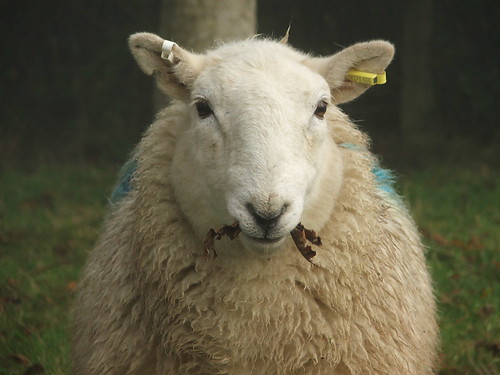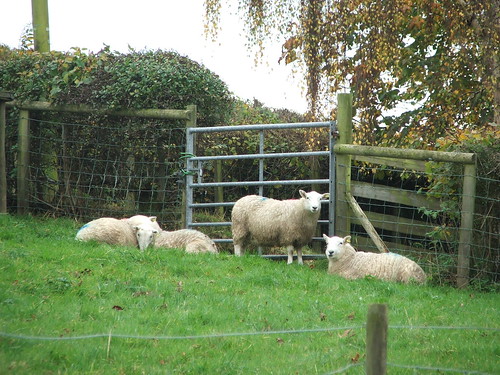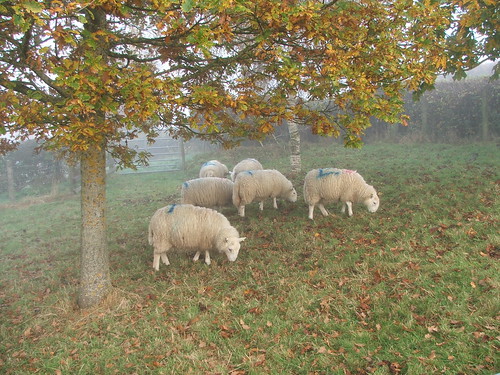Three months to the day since we moved here, we took our smallholding - and ourselves - through to a new phase: we have six sheep of our own. It is lovely to see them from the house; they bring new life and energy to our place.
They are Welsh Mountain ewes and we got them from a farm high up in the hills near Newtown who advertised them on a local Facebook group! How modern is that? It was good to see where they had come from and meet the farmer, a more personal approach to buying sheep than going down to the livestock market. On a clear day, we can actually see, from our house, the high hills about ten miles away where they have come from. We like that!
Our main purpose for having our sheep is to graze. Three acres is a lot and they will certainly help keep the grass down: they have been with us for 10 days now and we have already discovered they make excellent lawn mowers! They are too young to breed from this year so we have until next Autumn to decide whether we will want some lambs from them. It gives us time to get used to having them and time to think about what we do next.
This venture is taking us into the unknown. Our neighbour Paul came with us to see the sheep and he also collected them for us with his trailer, equipment we do not have just yet. We value his generous help and guidance, important at a time when we are beginning something new and are acutely conscious of our incompetence. There is a lot of confusing - and even conflicting - information out there and it seems that, apart from the obvious livestock welfare guides and rigorous paperwork, there are no hard and fast rules about keeping sheep. We are learning a lot about the different breeds of sheep and about the common problems they encounter and the various sprays we need to have on hand! We are reading and watching videos about shearing and clipping! We are coming up with plans on how to move them to the other fields without losing them down the lane! It feels very exciting to be expanding our skills and knowledge. Personal growth and development is important to us both and, whilst this inevitable and understandable phase of conscious incompetence that having sheep takes us through comes with challenges and stress, we relish the opportunity for growth and aliveness it offers us.
Our plan was to keep alpacas and we have not given up on them yet. Instead, we are starting off with sheep to give us confidence. Alpacas are considerably more expensive to buy than sheep and we thought that starting off with sheep would be a sensible way to ease ourselves into the world of livestock keeping.
So, here we are, proper smallholders now with our own - if only tiny - Welsh Hill flock. It is lovely to get to know our six ewes and for them to get to know and get used to us, although they are not eating out of our hands yet. Their different personalities are coming through; so far, we have identified a shy one who is always the last to come to us at feeding time and a curious one who is always the first! As we are beginning to recognise them, the next obvious task is to give them names... Any suggestions?



Naming is an interesting question. I am against (I don't believe in naming food) but my wife is pro (we need to be able to say so and so is limping). I suppose its fine, so long as the temptation to treat livestock as pets is avoided! So, names, How about Roast Donner Shish ...... No? :)
Posted on By ECL
Thanks for your contribution. I am pro naming for practical reasons, as you mention. I don't see our sheep as our pets and it would not bother me if "so and so" was in the freezer at some point or to even say that "part of so and so is in the oven". So, it's a yes to naming them!
Posted on By Maryline
And thanks for subscribing ECL :)
Posted on By Maryline
As they're Welsh, one could be "Taffy", another "Daffodil" ...
Posted on By Janet
Thanks, Janet. I like that!
Posted on By Maryline
I think that is wonderful and very wise to start with sheep, not alpacas. Hope you find a market for the wool, something that sheep farmers are now finding is expanding.
Posted on By Sheila Mills